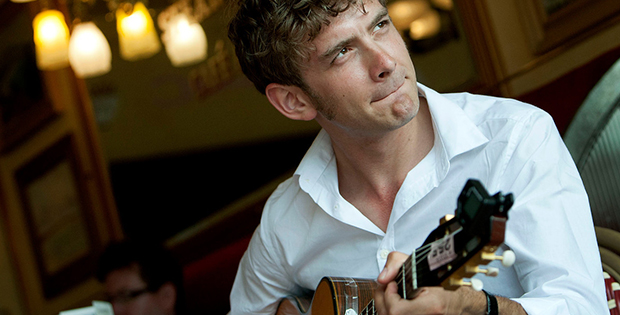Devo confessar que encontrei a música de Remi Harris quase por acaso. Ao navegar pelo YouTube, encontrei esta versão fantástica de um dos meus standards favoritos - “There Will Never Be Another You” - em que ele toca uma guitarra Carolan.
O seu bom gosto musical é requintado e a sua personalidade é calma e gentil. Espero que gostem das ideias de Remi Harris tanto quanto eu gostei de organizar estas entrevistas para vocês 🙂
1 - O que é que te inspirou a começar a tocar música? Fala-nos das tuas influências e do que se passava à tua volta nessa altura.
Comecei a tocar guitarra aos 7 anos, embora já tivesse tido guitarras de brincar antes disso. O meu pai tocava e ouvia muita música de guitarra, por isso cresci rodeado de sons e imagens de guitarras. As minhas primeiras influências foram principalmente o blues e o rock com base na guitarra dos anos 60 e 70. Artistas como Jimi Hendrix, Led Zeppelin, The Beatles, Eric Clapton, Peter Green, Chuck Berry e muitos outros.
2 - Como é que um guitarrista britânico como tu, com tantas grandes influências do Rock, começou a tocar Manouche?
Para mim, a guitarra sempre teve a ver com improvisação; é isso que adoro em muitas das primeiras bandas de rock e blues que cresci a ouvir. Eles estavam realmente a improvisar e a interagir uns com os outros no momento.
O jazz atraiu-me porque tem tudo a ver com improvisação, liberdade e experimentação. Foi uma progressão natural para mim, depois de ter passado a minha adolescência a tocar em bandas de rock e blues.
O Manouche foi a rota que mais me atraiu na altura devido à sua natureza alegre e divertida. Também gosto muito do som das guitarras do tipo gypsy jazz, que soam melhor com uma secção rítmica ao estilo Manouche (guitarra rítmica e contrabaixo).
3 - O que é que o motivou a nunca deixar de praticar?
Para mim, a guitarra era (e continua a ser) o meu brinquedo preferido. Praticar é algo que gosto muito de fazer; teria desistido há anos se alguma vez me sentisse aborrecido.
Sinto que há sempre algo de novo para aprender e explorar.
4 - Quais foram os maiores desafios que enfrentou para progredir na sua prática, performance e carreira musical?
O maior desafio para mim na minha carreira, até agora, foi aprender a falar em palco. Sou naturalmente muito tímido, mas se quisermos liderar a nossa própria banda, temos de ser capazes de interagir com o público, falar sobre as músicas que estamos a tocar, talvez arrancar algumas gargalhadas, etc. Falar em público era um dos meus maiores medos enquanto crescia.
5 - Quais são as principais diferenças e/ou semelhanças que encontra entre os géneros Manouche e Rock, em termos de técnica, som e sensação?
Acho que o jazz cigano é uma forma de jazz de alta energia/tempo acelerado, e pode dizer-se que o rock'n'roll é uma versão de alta energia/tempo acelerado do blues, pelo que ambos os géneros são naturalmente animadores na sua natureza.
Considero o alinhamento do gypsy jazz muito versátil. É possível tocar blues, swing, bebop, bossa, grooves de funk/hip hop, melodias clássicas, música do mundo, músicas pop e até músicas de rock neste formato, e funciona. Nada soa realmente fora do lugar, por isso, para mim, dá-me muitas possibilidades.
No entanto, a técnica envolvida na execução de guitarras de jazz cigano é diferente da forma como a maioria das pessoas toca outras guitarras e pode levar algum tempo a habituar-se a ela, dependendo da forma como se toca inicialmente. Mas nem toda a gente usa a técnica do tipo cigano, e não é essencial. Conheço grandes músicos do estilo Manouche que não tocam com esta técnica.
6 - Qual era o seu processo de prática nos primeiros tempos? Mudou ao longo dos anos?
Costumava tocar todos os dias. Não tinha um processo específico. Se gostava de alguma coisa, tentava aprendê-la. Era só isso. Atualmente, tenho um pouco mais de estrutura para tocar, porque agora é a minha profissão e tenho de a levar um pouco mais a sério.
7 - Fale-nos das suas rotinas. Como é que é um dia normal na sua vida?
Em média, diria que jogo entre 2 e 4 horas por dia. Isto é dividido ao longo do dia em sessões mais curtas. Gosto de jogar entre 30 minutos e 1 hora antes do pequeno-almoço, depois talvez mais uma ou duas horas após o pequeno-almoço. Depois saio, faço exercício, jogo futebol, trabalho administrativo, etc., e volto à guitarra no final do dia.
8 - Como é que equilibra o trabalho e o descanso? Qual a duração das suas sessões de trabalho e das suas pausas?
As minhas sessões de jogo podem variar, mas a média é de cerca de 30 minutos com intervalos entre elas. No entanto, pode depender muito do que estou a fazer.
9 - Que ingredientes chave gostas de ouvir na música que adoras?
Gosto de músicos que têm a sua própria abordagem. Prefiro ouvir as pessoas a fazerem as coisas à sua maneira, com as suas próprias reviravoltas únicas.
10 - Medita ou tem alguma prática semelhante?
Costumava meditar, mas descobri que a minha prática de guitarra e o exercício físico têm um efeito semelhante ao da meditação, pelo que já não o faço há algum tempo.

11 - Qual é o melhor conselho, citação ou referência que mantém perto de si?
Cuide da música e a música cuidará de si.
12 -Qual é o aspeto mais importante do percurso da sua vida que gostaria que as pessoas recordassem?
Gostaria de ser recordado por dar sempre o meu melhor em tudo o que faço.
13 - O que diria ao Django se tivesse a oportunidade de o conhecer?
Não sei o que lhe diria. Provavelmente “Obrigado”.
14 - Qual seria o disco, o músico ou a canção a que se referiria sempre numa conversa sobre Django?
Não sei que disco mencionaria. Sei que ele tinha um gosto musical alargado, por isso acho que podíamos começar uma conversa sobre qualquer coisa. Mas gostava de ver a reação dele aos System Of A Down. Tenho alguns amigos que experimentaram algumas músicas do tipo heavy metal neste género. Acho que pode resultar. Tudo é possível, de facto.
SEGUIR O NUNO EM:
Loja de livros do sítio Web: https://www.nunomarinho.com/store
Canal de vídeo: https://www.youtube.com/@NunoMarinho
Patreon: https://www.patreon.com/NunoMarinho
Instagram: https://www.instagram.com/nunomarinhoguitar/
Facebook: /https://www.facebook.com/NunoMarinhoGuitar/

